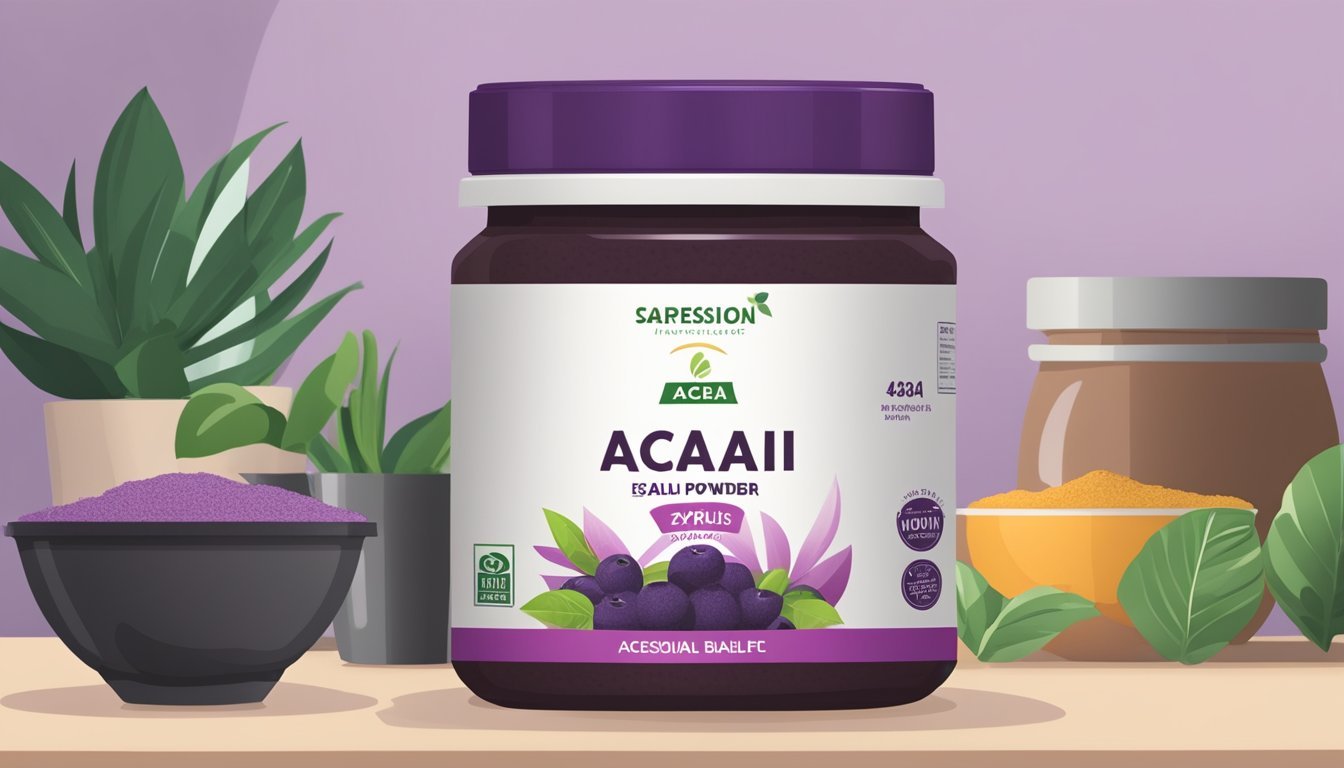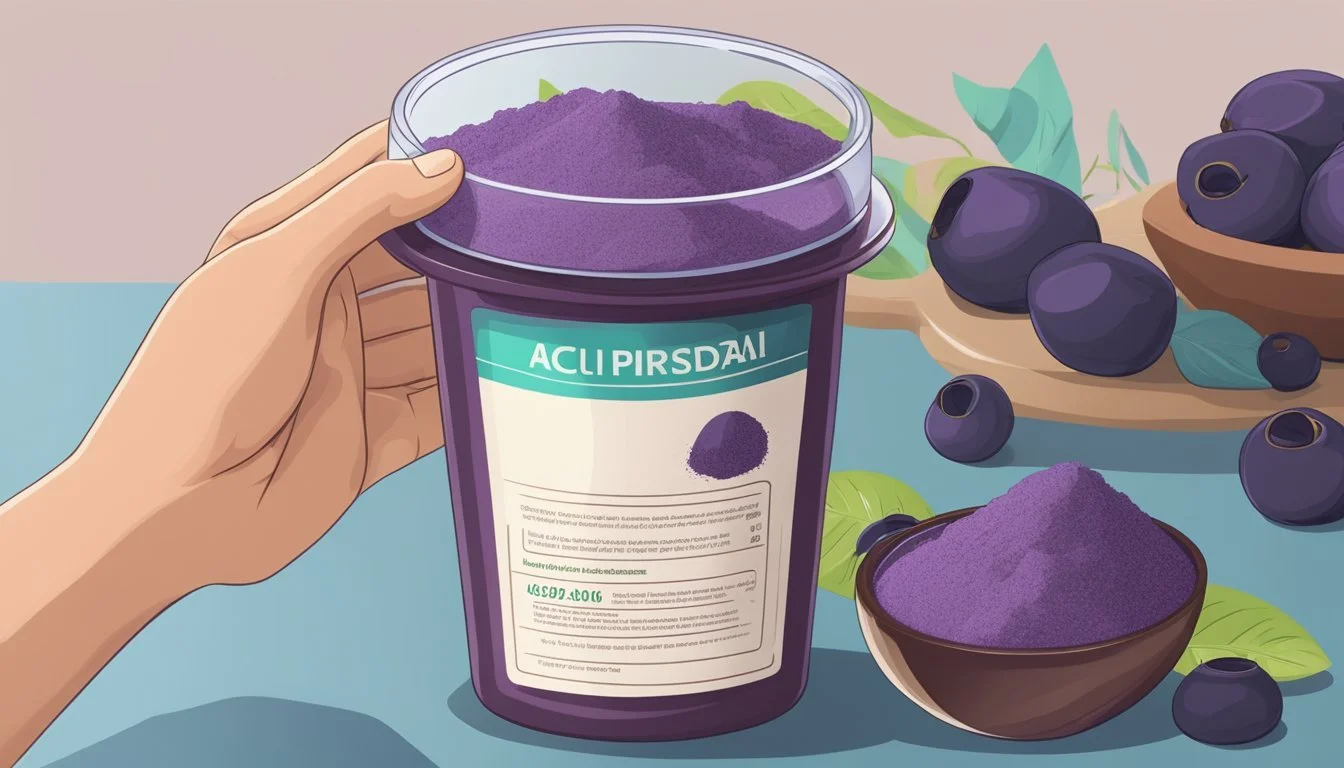Does Acai Powder Go Bad?
Understanding Shelf Life and Storage Tips
Acai powder, derived from the acai berry, is a product celebrated for its health benefits, primarily due to its high antioxidant content. These antioxidants play a crucial role in neutralizing free radicals, harmful molecules that can damage cells and lead to various health issues. The powder form of acai is not just valued for its potential health benefits but also for its convenience and versatility in various recipes.
To maintain its quality and potency, acai powder should be stored properly. Keeping acai powder in an airtight container, in a cool, dry place away from direct sunlight helps preserve its freshness. When stored correctly, acai powder can remain usable for up to two years. The shelf life may be indicative of the preservation of nutritional value, with properly stored acai powder retaining its beneficial compounds like dietary fiber, healthy fats, and vitamins.
With its increasing popularity, consumers are often concerned about whether acai powder can go bad. Like most food products, acai powder does have a shelf life and can degrade in quality over time, particularly if exposed to adverse conditions like moisture, heat, or light. It is therefore essential to understand the proper storage methods to ensure that the acai powder maintains its health-promoting properties.
Understanding Acai Powder
Acai powder is a concentrated form of the acai berry, known for its high nutrient content and versatility in various culinary applications.
Origin and Nutritional Profile
Acai berries originate from the Amazon rainforest in South America, where they have been a staple in the local diet for centuries. These small, dark purple fruits are harvested from the acai palm and are revered for their health-promoting properties.
Nutritional Information (per 100g of Acai Powder):
Calories: 533 kcal
Protein: 8.1 g
Total Fat: 32.5 g
Saturated Fat: 8.1 g
Monounsaturated Fat: 23.9 g
Total Carbohydrates: 52.2 g
Dietary Fiber: 44.2 g
Sugars: 0.0 g
Vitamins and Minerals:
Vitamin A: 750 IU
Calcium: 260 mg
Iron: 4.4 mg
Acai is also rich in antioxidants, particularly anthocyanins, which contribute to its high antioxidant capacity. The process of freeze-drying the berries into powder form helps in preserving these valuable antioxidants.
Common Forms and Uses
Acai is available in several forms, including powder, puree, and juice. The powdered form is created through a freeze-drying process that removes moisture, allowing it to retain most of the fruit's original nutritional value.
Common Uses of Acai Powder:
Superfood Smoothies: Acai powder is often used to boost the nutrient content in smoothies.
Breakfast Bowls: Acai bowls, typically made with acai puree, can also incorporate acai powder for an extra nutrient kick.
Energy Bars and Baking: It's utilized in energy bars for its fiber content and as a flavor enhancer in various baked goods.
Supplements: Due to its concentrated nutrients, it is frequently found in dietary supplements.
In its powdered form, acai is a convenient option for increasing one's intake of vitamins, minerals, and antioxidants, with the flexibility of being added to numerous recipes.
Health Benefits of Acai
Acai berries are known for their high antioxidant content and have been associated with various health advantages. These nutritional powerhouses can support heart health, assist in weight management, and may have benefits for those managing diabetes.
Antioxidant Properties
Acai boasts a remarkable antioxidant profile, crucial for combating oxidative stress in the body. These antioxidants, particularly anthocyanins, give the fruit its deep purple color and can neutralize free radicals. Regular consumption of acai can help reduce inflammation and protect cells from damage.
Antioxidants found in Acai:
Anthocyanins
Vitamin A
Vitamin C
Vitamin E
Heart Health
Acai berries contain heart-friendly compounds, which can offer protection against heart disease. The presence of anthocyanins may help in lowering cholesterol levels. Additionally, the fiber found in acai berries contributes to overall cardiovascular health by aiding in the maintenance of healthy blood pressure and blood sugar levels.
Components Beneficial for Heart Health:
Anthocyanins
Fiber
Healthy Fats
Weight Management and Diabetes
The fiber content in acai may be beneficial for weight management, as it promotes satiety and helps in controlling appetite. Moreover, acai's ability to regulate blood sugar levels makes it an ally for those with diabetes or at risk of the condition. Its anti-inflammatory properties also play a role in the metabolic processes associated with weight and blood sugar control.
Elements Aiding Weight Management and Diabetes:
Dietary Fiber
Healthy Fats
Low Sugar Content
Shelf Life and Storage
Acai powder offers the flexibility of a long shelf life when compared with its fresh or pureed counterparts. Proper preservation is the cornerstone for maintaining its quality and extending its usability period.
Proper Storage Techniques
Stored in an airtight container, acai powder remains stable and fresh for up to two years. Shielding it from direct sunlight is imperative as light can degrade its quality. Placement in a cool, dry cabinet or pantry is ideal to prevent the introduction of moisture which can contribute to spoilage. For those wishing to extend shelf life further, storing the container in the freezer can be beneficial, though it isn't necessary if the powder is stored properly elsewhere.
Culinary Uses of Acai Powder
Acai powder, known for its tart and sweet taste, brings a unique flavor profile to various dishes. It is predominantly featured in smoothie bowls and beverages, but also finds its way into an array of culinary recipes.
Creating Acai Bowls and Smoothies
When crafting acai bowls, the acai powder serves as a concentrated base that is often combined with liquids like water, juice, or milk to improve blendability before being mixed with frozen fruits. The resulting thick mixture is similar to a smoothie and is placed in a bowl to be consumed with a spoon. Common toppings for these bowls include:
Sliced bananas
Berries
Granola
Honey
Nut butters
The tartness of the acai is complemented by the sweetness of the toppings and the creaminess of the base.
Smoothies benefit from acai powder in a similar fashion. It is blended with a variety of fruits and liquids to create a nutritious, drinkable concoction. Incorporating acai powder into smoothies provides a berry-like flavor that is both tart and sweet, and it enhances the drink's nutritional value.
Incorporating into Recipes
Beyond bowls and beverages, acai powder finds its use in creative culinary applications. Its vibrant color and nutrient content make it an appealing addition to:
Yogurt parfaits
Oatmeal
Homemade energy bars
Salad dressings
The powder allows individuals to easily integrate the taste of acai into regular meals. Since it is less perishable than frozen acai puree, acai powder is a convenient alternative that maintains much of the fruit's nutritional benefits. While incorporating acai powder into recipes, one should balance its distinctive flavor with complementary ingredients to ensure a palatable outcome.
Considerations When Buying Acai Powder
When selecting acai powder, focusing on the product's quality and understanding the labels and brands can offer assurance of the powder's nutritional integrity and safety.
Choosing Quality Products
Quality Indicators:
Purity: Look for acai powder that contains no added sugars or artificial ingredients. A pure, concentrated form ensures that you're getting the most nutritional content.
Processing Method: Opt for freeze-dried acai powder to preserve maximum nutritional value, as this method retains most of the berry's original nutrients.
Color and Texture: High-quality acai powder typically has a rich, deep purple color and a fine, ground texture that should be free of clumps, which indicates proper storage and freshness.
Nutritional Content Considerations:
A nutritionist might advise checking the label for Daily Value (DV) percentages of essential nutrients. Quality acai powder should provide a good source of antioxidants, fiber, and possibly manganese, which is important for metabolism.
Understanding Labels and Brands
Label Analysis:
Ingredients List: A short list usually signifies a more natural and less processed supplement. Avoid products with a long list of additives.
Nutrition Facts: Verify the presence of nutrients cited by reputable sources like Sambazon, and compare the declared Daily Values.
Brand Reputation:
Research the brand to ensure that they adhere to safe manufacturing practices and source their acai responsibly.
Customer Reviews and Endorsements: Reading reviews can provide insight into the product's taste profile, often described as earthy, and its mixability in recipes.
Risks and Precautions
Careful consideration of potential allergic reactions and drug interactions is crucial when incorporating acai powder into the diet. Certain medical conditions may also influence how the body responds to this supplement.
Potential Allergies and Interactions
Individuals may experience allergic reactions to acai powder. Common allergy symptoms include:
Itching
Swelling
Difficulty breathing
It is essential to note any known berry allergies and consult with a healthcare provider before consuming acai products.
Acai may also interact with medication, affecting its potency or absorption. Especially, medications related to:
Heart health
Cholesterol levels (both LDL and HDL)
Consumers should speak with a healthcare professional to assess the risk of interactions with their current medications.
Limitations and Medical Considerations
People with pre-existing health conditions should use acai powder with caution:
Heart-related conditions: While acai has compounds that may benefit heart health, those with cholesterol-related issues should monitor their intake.
Cancer and tumors: Acai contains antioxidants believed to combat cellular damage, but individuals with a history of cancer such as prostate cancer should consult healthcare providers for tailored advice.
Liver disease: Those with liver conditions should verify if acai's detoxifying properties are safe for their situation.
A holistic approach to health should factor in possible risks, and professional medical advice is always recommended.






